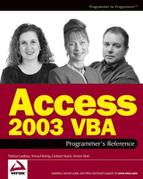L.1. Windows Registry Data Types
In the same way that database table fields, variables, and API parameters require data of specific types, the kind of data the Registry can store is also defined in terms of data types. The following data types are supported under Windows 2000.
L.1.1. REG_BINARY
This data type specifies raw binary data. Most hardware information is stored with this data type, which can be displayed and entered in binary or hexadecimal format.
L.1.2. REG_DWORD
This data type is a 32-bit (4-byte) number, which is used to store Boolean values and information about many device drivers and services. REG_DWORD values can be displayed and edited as binary, hexadecimal, or decimal format.
L.1.3. REG_DWORD_LITTLE_ENDIAN
This data type is the same as REG_DWORD, a 32-bit number, but it is used to store values in a specific way. In REG_DWORD_LITTLE_ENDIAN, the most significant byte contains the high-order byte (leftmost). This is the most common format for storing numbers in Windows 98 and 2000.
L.1.4. REG_DWORD_BIG_ENDIAN
The only difference between this data type and REG_DWORD_LITTLE_ENDIAN is that this data type stores the most-significant byte as the low-order byte (rightmost). This is the opposite order in which bytes are stored in the REG_DWORD_LITTLE_ENDIAN data type.
L.1.5. REG_EXPAND_SZ
This data type is a variable-length text string, and is used to store variables that are resolved when an application or service uses the data. For example, some values include the variable Systemroot. When a service or application references the data in this data type, it is replaced by the name of the directory containing the Windows system files.
L.1.6. REG_LINK
This data type is used to store a symbolic link between system or application data, and a registry value. REG_LINK supports both ANSI and Unicode characters.
L.1.7. REG_MULTI_SZ
This data type is used to store multiple strings that are formatted as an array o null-terminated strings, the last of which is terminated by an extra null character. This means the entire array is terminated by two null characters.
The values in this data type can be separated by spaces, commas, or other characters.
L.1.8. REG_SZ
This data type is a fixed-length string. Boolean values and short-text strings are usually stored with this data type.
L.1.9. REG_FULL_RESOURCE_DESCRIPTOR
This data type is used to store a series of nested arrays, for resource lists (often for hardware components or drivers). These data types are declared as constants using the VBA Const keyword. For convenience, we have included these constant declarations a little later in this chapter.
